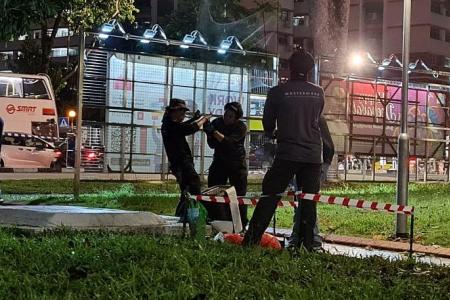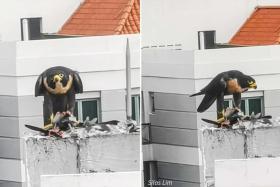About 6 in 10 birds caught by NParks, town council in Choa Chu Kang hot spot culled
The National Parks Board (NParks) and the Chua Chu Kang Town Council worked together to catch and cull red-breasted parakeets at a Choa Chu Kang housing estate, where hundreds of these non-native birds flock together.
In response to queries from The Straits Times, NParks and the town council said on Monday that about 60 per cent of the birds caught were “humanely put down” after it was established they were not native to Singapore.
They did not give exact figures.
Resident Lui Wai Kit, 54, said he first witnessed people netting dozens of parakeets and placing the screeching birds in boxes near Block 416 Choa Chu Kang Avenue 4 on Nov 2.
“These parakeets have been growing in number since at least 2017. Every day, I see flocks flying around the estate and roosting on the trees,” said Mr Lui, who has lived in the estate for 30 years.
But since dozens were caught over the past two weeks, smaller groups of 10 have flown past instead of the usual large flocks, said the resident, who enjoys watching the lively birds and rears eight parrots.
NParks and Chua Chu Kang Town Council told The Straits Times that they had worked on a suite of bird management measures, including tree pruning and trapping using mist nets, to control the parakeet population established near residential areas in Choa Chu Kang.
“During such operations, we will release any native species and humanely put down birds of non-native species that have established populations,” they added.
The non-native birds – known as moustached parakeets – were introduced to Singapore in the 1940s through the pet trade. Their population here has increased over the years, becoming self-sustaining with local breeding recorded, said NParks and the town council.
“When present in large numbers, the red-breasted parakeets compete with our native bird species for food and nesting sites, and may negatively impact our native biodiversity. They may also indirectly affect native biodiversity through the transmission of exotic diseases and parasites,” they said.
As sociable creatures, their noise can be disruptive to members of the public, NParks and the town council added.
The culling is part of regular efforts by NParks to remove invasive species in nature reserves and other green spaces when they are observed.
Unlike native species that are naturally limited by factors including the availability of food and predators, established groups of non-native flora and fauna can increase exponentially and crowd out native species.
Non-native bird species are managed through studies to understand their roosting patterns and movements, as well as habitat modification to disrupt the birds’ roosts and direct them away from areas of high residential density, among other population strategies, said NParks and the town council.
Under the Parks and Trees Act, offenders caught releasing animals in parks and nature reserves can be charged and fined up to $50,000. Under the Wildlife Act, offenders caught releasing wildlife can be fined up to $5,000.
Get The New Paper on your phone with the free TNP app. Download from the Apple App Store or Google Play Store now


